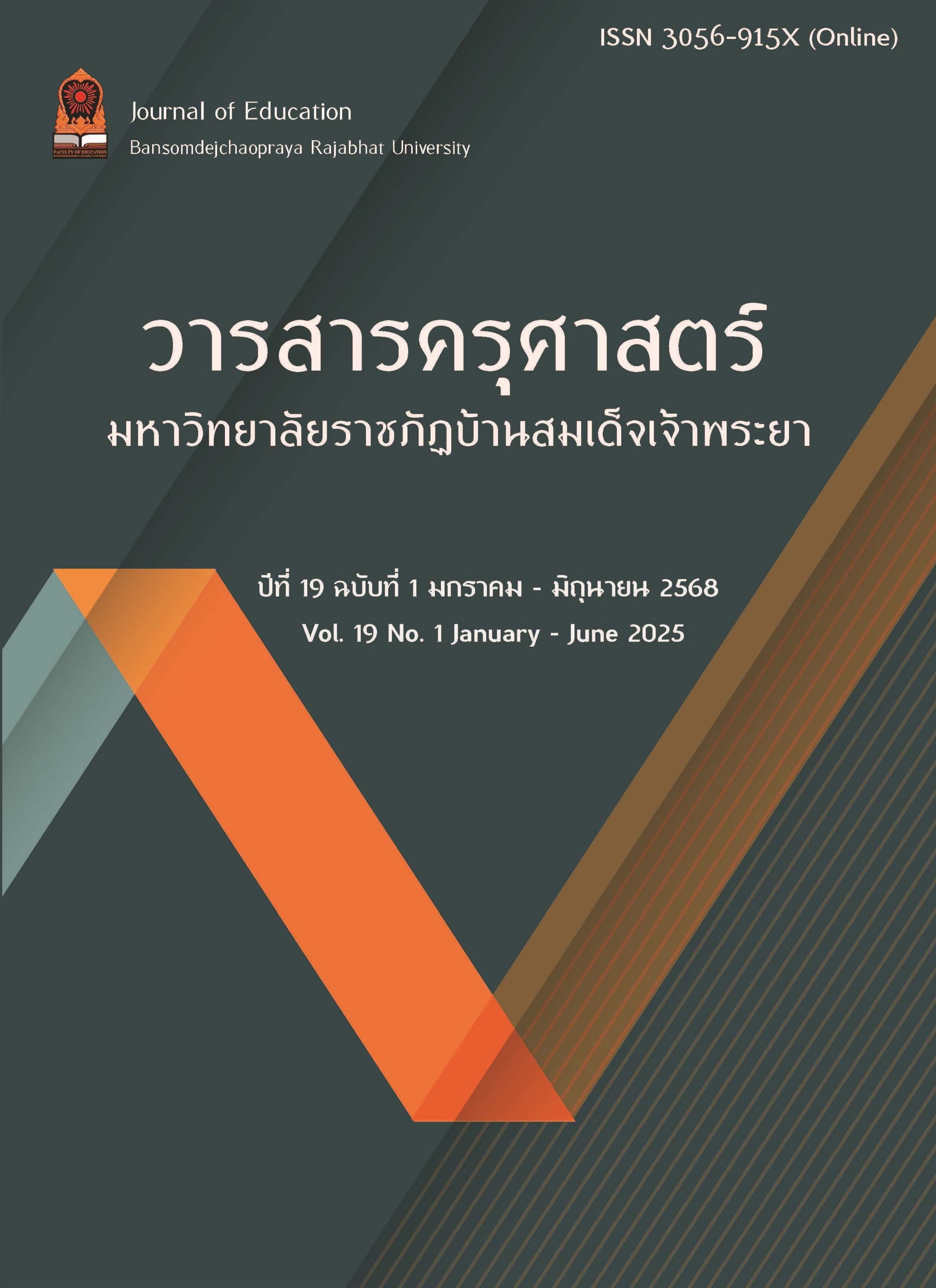Use of Concept-Based Language Instruction and Feedback to Enhance English Reading Abilities of Second Year Students, Lampang Rajabhat University, Muang District, Lampang Province
Keywords:
concept-based language instruction, feedback, english reading abilityAbstract
The purposes of this research were to study and compare the English reading abilities of second-year students before and after the implementation of Using Concept-Based Language Instruction and Feedback, aimed at enhancing their English reading abilities. The study was conducted at Lampang Rajabhat University. The target group comprised 20 second-year students enrolled in the course "Critical Reading for Teachers of English (1092301)" during the second semester of the academic year 2023. The research employed experimental instruments consisting of six carefully designed lesson plans integrating Concept-Based Language Instruction and Feedback to facilitate students’ reading comprehension and analytical skills. Additionally, an English reading proficiency test was utilized as a data collection tool. Data analysis involved the use of descriptive statistics, including calculating mean scores, percentages, and standard deviations, to determine the effectiveness of the instructional approach.
The results of the study can be summarized as follows:
1. After the implementation of Concept-Based Language Instruction and Feedback, students' English reading abilities improved from a moderate level (68.33%) to a very good level (83.50%). Notable progress was observed in identifying main ideas, answering analytical questions, and inferring word meanings from context. These outcomes indicate an enhanced depth of reading comprehension and analytical performance compared to the pre-instruction stage.
2. The use of Concept-Based Language Instruction and Feedback effectively enhanced students’ reading development. Students demonstrated clearer analytical thinking in reading tasks, including identifying core concepts and answering higher-order questions. These improvements reflect a more structured and effective reading process when compared to their performance prior to the intervention.
Downloads
References
กรมวิชาการ. (2544). หลักสูตรการศึกษาขั้นพื้นฐาน พุทธศักราช 2544. กรุงเทพฯ: องค์การรับส่งสินค้าและพัสดุภัณฑ์.
ชลิตา ชาญวิจิตร และธีรวัฒน์ จันทึก. (2561). การให้ข้อมูลป้อนกลับที่ส่งผลต่อการปฏิบัติงานของพนักงานในสายการผลิต (Feedbacks giving that affect the performance of employees in the production line). วารสารการศึกษา Veridian E-Journal. Silpakorn University, 11(1), 290-302.
ผัสสพรรณ ถนอมพงษ์ชาติ, สุมาลี ชิโนกุล และ สำลี ทองธิว. (2556). การศึกษาความเหมาะสมของการประยุกต์ใช้การประเมินแบบเสริมพลังอำนาจ ในการประเมินหลักสูตรวิชาชีพระยะสั้น และความเป็นไปได้ในการนำไปใช้ในสถานศึกษา. วารสารเทคโนโลยีสุรนารี, 7(2), 37-57.
วรรณรัตน์ ศรีกนก. (2561). การจัดการเรียนรู้โดยใช้ความคิดรวบยอดเป็นฐาน. วารสารพยาบาลทหารบก, 19(3), 10-18.
สมุทร เซ็นเชาวนิช. (2542). เทคนิคการอ่านภาษาอังกฤษเพื่อความเข้าใจ (พิมพ์ครั้งที่ 10). กรุงเทพฯ: สำนักพิมพ์จุฬาลงกรณ์มหาวิทยาลัย.
Cohen, L., Manion, L., & Morrison, K. (2018). Research methods in education (8th ed.). Routledge.
Crystal, D. (2003). English as a global language (2nd ed.). Cambridge University Press.
Daft, R. L., & Lewin, A. Y. (2008). Perspective—Rigor and relevance in organization studies: Idea migration and academic journal evolution. Organization science, 19(1), 177-183.
Erickson, L. (2002). Concept-based curriculum and instruction: Teaching beyond the facts. Thousand Oaks, Calif. : Corwin Press.
Grabe, W., & Stoller, F. L. (2019). Teaching and researching reading. Routledge.
Guilding, C., Kelly, R., Netere, A., Babey, A. M., Restini, C., Cunningham, M., Kelly, J., Koenig, J., Karpa, K., Hawes, M., Tucker, S., Angelo, T., & White, P. (2023). Developing an international concept-based curriculum for pharmacology education: Core concepts and concept inventories.
Harris, A. J. (1990). How to increase reading ability: A guide to developmental and remedial methods. New York: Longman.
Nation, I. S. (2008). Teaching ESL/EFL reading and writing. New York : Routledge.
UNESCO, P. (2021). Reimagining our futures together: A new social contract for education. Paris, France: Educational and Cultural Organization of the United Nations.
Wiggins, G., & McTighe, J. (2011). The understanding by design guide to creating high-quality units. ASCD.
Williams, J. L. (1986). The Behavioral and the Mystical: Reflections on Behaviorism and Eastern Thought. The Behavior Analyst, 9(2), 167-173.
Downloads
Published
How to Cite
Issue
Section
License
Copyright (c) 2025 Faculty of Educaion Bansomdejchaopraya Rajabhat University

This work is licensed under a Creative Commons Attribution-NonCommercial-NoDerivatives 4.0 International License.
บทความที่ได้รับการตีพิมพ์เป็นลิขสิทธิ์ของคณะครุศาสตร์ มหาวิทยาลัยราชภัฏบ้านสมเด็จเจ้าพระยา
ข้อความที่ปรากฏในบทความแต่ละเรื่องในวารสารวิชาการเล่มนี้เป็นความคิดเห็นส่วนตัวของผู้เขียนแต่ละท่านไม่เกี่ยวข้องกับมหาวิทยาลัยราชภัฏบ้านสมเด็จเจ้าพระยา และคณาจารย์ท่านอื่นๆในมหาวิทยาลัยฯ แต่อย่างใด ความรับผิดชอบองค์ประกอบทั้งหมดของบทความแต่ละเรื่องเป็นของผู้เขียนแต่ละท่าน หากมีความผิดพลาดใดๆ ผู้เขียนแต่ละท่านจะรับผิดชอบบทความของตนเอง



